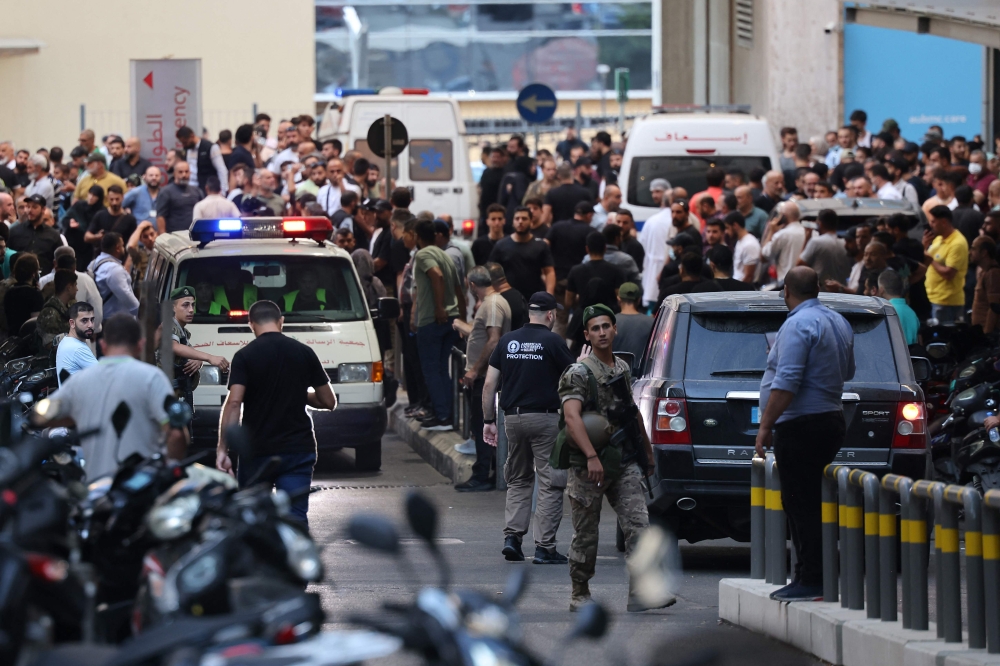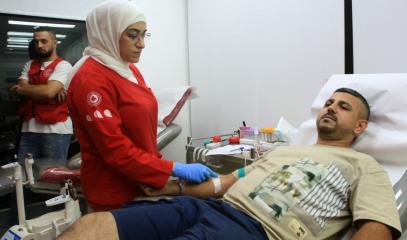Shock and solidarity in Lebanon the day after Israel's attack against Hezbollah
The operation that killed at least 12 people and wounded more than 2,800, several of them seriously, represents an absolute first. The explosion of pagers took the pro-Iranian group by surprise, weakening its potential. Everyone is now waiting for Nasrallah's response, while many Lebanese are donating blood for the wounded like after the 2020 port explosion. Many now fear that the attack could be the prelude to a large-scale conflict.
Beirut (AsiaNews) – Israel yesterday dealt a stunning and hard blow to Hezbollah, "a first in the modern history of warfare”, this according to the Ici Beyrouth news site, by deceiving and simultaneously blowing up a thousand pagers, small wireless communication devices, which Hezbollah had bought to replace mobile phones, since Israel could easily locate them.
Taking advantage of the situation, Israel was able to locate and eliminate cadres and activists of the pro-Iranian Lebanese movement, whose leader Hassan Nasrallah (who escaped by pure chance) is expected to give a speech to the nation tomorrow.
The attack sparked a wave of human solidarity, in hospitals, like the one that followed the explosion at the Port of Beirut on 4 August 2020.
An initial assessment by Lebanon’s outgoing Minister of Health, Firas Abiad, reported nine deaths and more than 2,800 people wounded, including several hundred seriously, but the number is provisional.
Scores of people have been injured to the face, especially the eyes, as well as the fingers. Some have lost a hand, the minister said. The Hôtel-Dieu Hospital announced that it performed 25 delicate eye operations overnight.
Those killed included the son of Hezbollah MP Ali Ammar, as well as a 10-year-old girl.
Iran's ambassador to Beirut, Mojtaba Amani, was also wounded, as were (but this is unconfirmed), the sons of MP Hassan Fadlallah and the head of the Shia party's coordination unit, Wafic Safa. Seven Hezbollah members were victims of explosions in Syria.
Impact of the explosions
The impact of these explosions on Hezbollah's communications was not immediately clear.
According to journalist Scarlett Haddad, the coup certainly disorganises the party's communications, but its impact is more moral than military, and does not change the balance of power on the ground.
But, she added, we will have to wait and see if this attack is the prelude to broader action or, with a bit of a chance for Lebanon, an alternative to it.
In any case, she notes, it gives a new and completely new dimension to the confrontation between Israel and Hezbollah, and suggests that Israel may have succeeded in planting "moles" inside the logistical unit of the self-styled Party of God.
Still, the journalist believes that the party's response will be "within the existing framework of tacit rules of engagement", adding that Hezbollah "does not want war".
Wave of panic
A wind of real panic blew on Tuesday around 3:30 pm in several parts of Lebanon, when hundreds of Hezbollah members were suddenly thrown to the ground, bleeding, following the simultaneous explosion of their "pagers".
After a moment of stupor, despite various explanations put forward about how Israel did it, a source close to Hezbollah told AFP that the pagers that exploded are from a shipment of a thousand devices recently imported by Hezbollah and which seem to have been intercepted before their arrival in Lebanon.
Adding weight to this, officials from the United States and other countries, quoted by AFP, told the New York Times that Israel had managed to hide small explosives in pagers bought by Hezbollah from Taiwan.
Hezbollah had ordered more than 3,000 devices, mainly the AP924 model, from the Gold Apollo company, which refused to supply them directly and subcontracted the sale to a third company in Hungary.
According to sources quoted by Sky News Arabia, Mossad placed a quantity of PETN (pentaerythritol tetranitrate), a liquid explosive, on the batteries of these communication devices, and set it off by increasing the temperature of the battery.
Before these revelations, the operation had raised a central question: Was it the pagers’ overheated lithium batteries that exploded or were the devices modified beforehand?
For Edward Snowden, the US whistleblower based in Russia, quoted by AFP, there were, “Too many consistent, very serious injuries,” and not enough "fires and misfires" to support the idea of “overheated batteries exploding”.
Reactions
As usual in such cases, Israel has refrained from making the slightest comment on this unprecedented operation. However, the Israeli General Staff held an "evaluation meeting" on Tuesday evening, on “the military readiness for the dual offensive and defensive plan on all fronts.”
Israel had announced just hours before the attack its decision to extend "its war aims" to its border with Lebanon to allow its citizens to return home in northern Israel.
The United States was "not warned" in advance of the explosions, the State Department said, but it urged Iran to avoid any act that would escalate tensions in the region, which many doubt.
For the United Nations, this series of explosions marks an “extremely worrying escalation”.
The Lebanese government, for its part, denounced "a flagrant attack on Lebanese sovereignty" and is preparing to file a complaint against Israel before the UN Security Council.
Education Minister Abbas Halabi sensibly announced the closure of schools and universities today (Wednesday).
Meanwhile, scuffles broke out between Hezbollah and Lebanese Forces militants at the entrance to Mount Lebanon Hospital, amid a rush of ambulance arrivals.
Air France and Lufthansa temporarily suspended their flights to Beirut airport.








.png)










